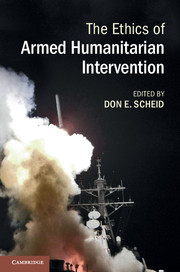Book contents
- Frontmatter
- Contents
- Notes on contributors
- Preface and acknowledgments
- List of abbreviations and acronyms
- Part I Intervention and debate
- Part II Moral perspectives
- 4 The moral basis of armed humanitarian intervention revisited
- 5 All or nothing
- 6 Judging armed humanitarian intervention
- 7 Bombing the beneficiaries
- Part III Ideas and reconsiderations
- Select bibliography
- Index
- References
5 - All or nothing
Are there any “merely permissible” armed humanitarian interventions?
Published online by Cambridge University Press: 05 June 2014
- Frontmatter
- Contents
- Notes on contributors
- Preface and acknowledgments
- List of abbreviations and acronyms
- Part I Intervention and debate
- Part II Moral perspectives
- 4 The moral basis of armed humanitarian intervention revisited
- 5 All or nothing
- 6 Judging armed humanitarian intervention
- 7 Bombing the beneficiaries
- Part III Ideas and reconsiderations
- Select bibliography
- Index
- References
Summary
After World War II, human-rights standards became international law, but the legitimacy of their enforcement would not be recognized for quite some time. If anything, the ban on foreign intervention to defend human rights was strengthened following the inception of the United Nations, which has as its foundation the “principle of the sovereign equality of all its Members.” It was not until the 1990s that a new norm of international relations began to emerge. In his 1999 Annual Report, UN Secretary-General Kofi Annan made reference to the “developing international norm in favour of intervention to protect civilians.” The following year, Human Rights Watch applauded the “evolution in public morality” as a result of which “the international community seems more willing to deploy troops to halt massive slaughter.” The next round of punctuated equilibrium saw the right of intervention evolve into a duty. The International Commission on Intervention and State Sovereignty, formed under the auspices of the United Nations, formalized the transition in its 2001 report The Responsibility to Protect.
An increasingly common view among political philosophers is that, in fact, all justified humanitarian intervention is obligatory. There is no such thing as “merely permissible”: either there is a duty to intervene, or there is a duty not to intervene. Call this the “all-or-nothing view.” In this chapter, we argue that even in the face of the most severe human-rights abuses, the citizens of even the most affluent countries do not always have an obligation to sustain the costs associated with carrying out an otherwise justified humanitarian intervention, whether unilaterally or as part of a multilateral effort. This becomes apparent once certain features of the duty to aid are fully appreciated. We also consider the possibility that humanitarian interventions, which are permissible but discretionary for citizens, are always either obligatory or prohibited for their government, depending on the circumstances. Despite appearances, this is neither paradoxical nor incoherent. Nevertheless, we will suggest that the all-or-nothing view cannot be salvaged regardless of whom we take its referent to be – the state, or its people.
Keywords
- Type
- Chapter
- Information
- The Ethics of Armed Humanitarian Intervention , pp. 78 - 94Publisher: Cambridge University PressPrint publication year: 2014
References
- 1
- Cited by



